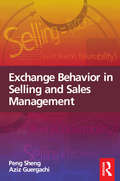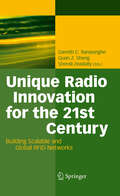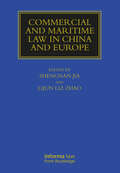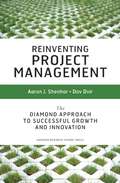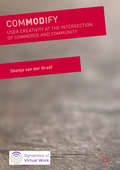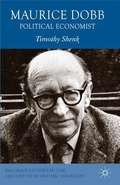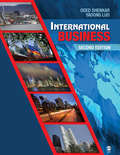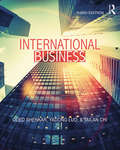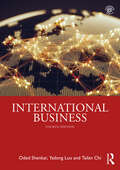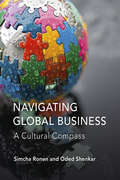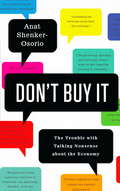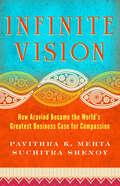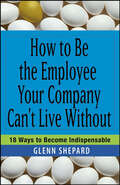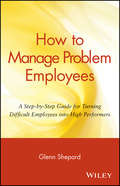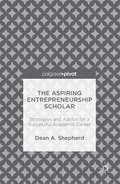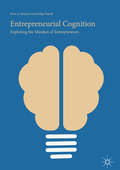- Table View
- List View
Exchange Behavior in Selling and Sales Management
by Peng Sheng Aziz GuergachiExchange Behavior in Selling and Sales Management presents a pragmatic and easy-to-implement framework for the successful operation of selling and sales management. Focused specifically on the value-exchange behavior of buyers and sellers, the book is composed of eight fundamental building blocks, which provide:* A revolutionary framework to describe the dynamics of consumer and organizational buying processes* A scientific, analytical approach to the personal elements in selling * A much needed insight into the personal interactions between buyers and sellers, both the implicit and explicit * A new and unique structure which integrates psychographic data mining and modeling techniques in a sales context, for the first time Exchange Behavior in Selling and Sales Management reflects selling and sales management practices within the field, based upon the extensive experience of the authors and other contributors. It is essential reading for advanced students, practitioners and researchers in sales and marketing.
Unique Radio Innovation for the 21st Century
by Quan Z. Sheng Damith C. Ranasinghe Sherali ZeadallyAre you an engineer or a researcher developing RFID systems? Are you a manager considering deploying RFID-based applications? If so, this book is for you. Covering modern RFID systems, the challenges to RFID implementation are addressed using specific industrial research examples and common integration issues. The primary focus is on answering questions surrounding building scalable global Internet-based RFID networks. Key topics include RFID data management, RFID data processing and integration, Real-Time Locating Systems (RTLS) and sensors. The book considers the challenges of and solutions to building and exploiting global networks to guarantee one of the most important business drivers for modern RFID technology: traceability. The authors have drawn together RFID applications from the retail supply chain, asset and product lifecycle management, anti-counterfeiting and cold chain management to explore how global traceability networks can be created using RFID and sensor technologies. They present insights from world's leading research laboratories.
Economic Openness and Territorial Politics in China
by Yumin ShengWhy and how has the Chinese central government so far managed to fend off the centrifugal forces under rising globalization that are predicted to undermine national-level political authority everywhere? When institutionally empowered by centralized governing political parties as in China, national politicians confronting the menace of economic openness will resort to exercising tighter political control over the subnational governments of the "winner" regions in the global markets. Although its goal is to facilitate revenue extraction, redress domestic economic disparity, and prolong the rule of national leaders, regionally targeted central political control could engender mixed economic consequences at the subnational level. Yumin Sheng examines the political response of the Chinese central government, via the ruling Chinese Communist Party, to the territorial challenges of the country's embrace of the world markets, and the impact of the regionally selective exercise of political control on central fiscal extraction and provincial economic growth during the 1978-2005 period.
Fundamental Theories of Mega Infrastructure Construction Management
by Zhaohan ShengFundamental Theories of Mega Infrastructure Construction Management: Theoretical Considerations from Chinese Practices is a collection of decades of research and applications of managing megaprojects using theories of complex systems and management sciences. It presents basic (classical) theory of megaproject management and is a showcase of more than 30 years of research of complex system and management sciences on the theory of megaproject management resulting from the integrating of theory and practice of megaprojects. The theory and models have undergone rigorous systematic testing during the management and implementation of megaprojects in China. Megaprojects are huge undertakings, often in infrastructure (bridges, tunnels, airports, etc. ) that involve huge levels of investment, often take years to complete, and typically run into delays, cost overruns, and any number of unforeseen problems. Over the last few decades, no one country has undertaken more of these projects than China, and this book presents the fundamental theories underlying the practice of Mega Infrastructure Construction Management as practiced in China. Individual chapters provide a basic definition of Mega Infrastructure Construction and it's management; an overview of the theories behind it; the Formation Path; basic concepts; fundamental principles; scientific problems; the Method System of Meta-synthesis; specialized methods in research; and intelligent management of Mega Infrastructure Construction. Although the theoretical construction management problems in this book are derived from construction practices in China, they can be applied universally and extended for great fundamental significance.
Commercial and Maritime Law in China and Europe (Maritime and Transport Law Library)
by Shengnan Jia and Lijun Liz ZhaoBoth China and Europe have a long tradition of commercial and maritime law; and this new book examining various topics from their particular perspectives is both timely and important. It links the vital component of maritime law with commercial law, financial law and trade policy. The book has performed a remarkable task in making connections between China and Europe through the lenses of substantive and procedrual laws, covering a wide range of areas, including commercial law, insurance law, salvage, EU maritime law and Brexit, carriage of goods by sea, arbitration, mediation, litigation, the recently formed China International Commercial Court, and different liability regimes, as well as a brief look forward into new initiatives and artificial intelligence in the digital age. In these challenging times, we all have much to learn from each other in seeking to find answers to what are often difficult problems. This book provides a welcome opportunity for anyone interested in commercial and maritime law to engage in that learning exercise and, looking ahead, thereby to help solve such problems as may arise in the future – in a practical and fair manner. It is therefore of great relevance to both the academic field and the legal practice field in China and Europe.
Reinventing Project Management: The Diamond Approach To Successful Growth And Innovation
by Aaron J. Shenhar Dov DvirProjects are the engines that drive innovation from idea to commercialization. In fact, the number of projects in most organizations today is expanding while operations is shrinking. Yet, since many companies still focus on operational excellence and efficiency, most projects fail-largely because conventional project management concepts cannot adapt to a dynamic business environment. Moreover, top managers neglect their company's project activity, and line managers treat all their projects alike-as part of operations. Based on an unprecedented study of more than 600 projects in a variety of businesses and organizations around the globe, Reinventing Project Management provides a new and highly adaptive model for planning and managing projects to achieve superior business results.
ComMODify: User Creativity at the Intersection of Commerce and Community (Dynamics of Virtual Work)
by Shenja van der GraafThis book critically analyses user-firm technology relationships and socioeconomic structures at the crossroads of community and commerce. It investigates businesses that let users participate in platform development on the internet. An empirical study of the online world Second Life is used as an early illustration of the pivotal role of user participation in design, development and sustainability of digital platforms. Van der Graaf sheds light on aspects of the ongoing platformization of the internet and on new norms and mechanisms for user participation which are linked to values of creativity, community and labour. ComMODify makes clear that robust theoretical and empirical investigation of the integration of user participation into mainstream business models and its implications for platform development is key to understanding contemporary businesses like Facebook, that sustain the internet of today. This book will be of interest to those wanting to learn more about the socio-economic implications of user participation associated with user-generated content, particularly within the 3D software and game industry.
Hope Indeed: Remarkable Stories Of Peacemakers
by N. ShenkGerald Shenk has traveled to and lived in many difficult places. He goes to teach-and to spot people who act out of hope. When he began to feel fortified by what he discovered, even foolishly rich, he wrote what he had witnessed and heard for the rest of us. Hope Indeed! is his collection of stories of stunningly ordinary people behaving with extraordinary hope. Here are the stories of- Ned Wyse, a farmer/pastor in Michigan, chosen randomly for a violent beating by some neighborhood kids, and what he did about it. The Palestinian parents who gave their young murdered son's organs to ill Jewish children. The Amish, who subverted the vicious violation of their innocent children in the Nickel Mines school by refusing to multiply the horror, and instead offered forgiveness and generosity. Jewish Cantor Michael Weisser and his family who took carry-out food to the white supremacists who had harassed them mercilessly. The German Lutheran pastor couple who offered their home to recently desposed and homeless Erich Honecker, who had ruthlessly ruled East Germany. Brother Ivo who kept bringing former Catholic and Muslim neighbors together as war escalated in Bosnia. Says Shenk, "Here are stories to rehearse if we want to become people who subvert vengeance with kindness."
Maurice Dobb: Political Economist
by Timothy ShenkThis book explores the life of the man whom even his critics acknowledged was one of the world's most significant Communist economists. From his outpost at the University of Cambridge, where he was a protégé of John Maynard Keynes and mentor to students, Dobb made himself into one of British communism's premier intellectuals.
Copycats
by Oded ShenkarIn the business world, imitation gets a bad rap. We see imitating firms as ?me too? players, forced to copy because they have nothing original to offer. We pity their fate: a life of picking up crumbs discarded by innovators striding a path paved with fame and profit.In Copycats, Oded Shenkar challenges this viewpoint. He reveals how imitation?the exact or broad-brushed copying of an innovation?is as critical to prosperity as innovation.Shenkar shows how savvy imitators generate huge profits. They save not only on R&D costs but also on marketing and advertising investments made by first movers. And they avoid costly errors by observing and learning from others? trials.Copycats presents suggestions for making imitation a core element in your competitive strategy and pairing it powerfully with innovation, including:· How to select the right model to imitate· How to avoid oversimplification of a model· Which imitation strategy to use· How to prepare and execute an implementation planEngaging, practical, and rich in company examples, Copycats unveils how to add imitation to your competitive arsenal.
International Business: Third Edition (International Business Ser.)
by Oded Shenkar Yadong Luop>Written by globally renowned scholars in the field of international business, International Business, Second Edition takes a truly global perspective that goes beyond the United States, presenting the latest concepts, tools and events, and adopting integrated and problem-solving approaches in every chapter. The book highlights the role of culture, politics and legal issues in international business and illustrates how they influence institutions, structures and processes that permeate all functions of business.
International Business
by Oded Shenkar Yadong Luo Tailan ChiThe third edition of International Business offers an action-focused, practical approach to the topic, helping students understand the global business environment and its repercussions for executives. The book provides thorough coverage of the field, delving into fundamental concepts and theory; the cultural, political, and economic environment; international business strategies; and even functional management areas. More comprehensive than competing books, International Business includes: Strengthened, expanded global cases, examples, and 'industry' and 'country' mini-cases that give students practical insight into the ways companies actually behave within a competitive, global environment Updated coverage of key trends that impact how international business functions, including the drivers of globalization, e-commerce and the impact of the Internet, and international entrepreneurship New material on technology issues, the impact of the financial crisis, and problems in the EU Expanded discussion of the skills and strategies students need to succeed in today's international business environment, including dynamic capabilities, foreign direct investment, and market entry strategies Also featuring a companion website with a test bank, Powerpoint slides, and instructor’s manual, this book is ideal for undergraduate and graduate students and instructors of any international business course.
International Business
by Oded Shenkar Yadong Luo Tailan ChiThis fully revised and updated fourth edition of International Business offers an action- focused, practical approach to the topic, helping students understand the global business environment and its repercussions for executives. The book provides thorough coverage, delving into fundamental concepts and theory; the cultural, political, and economic environment; international business strategies; and even functional management areas. More comprehensive than competing books, this new edition of International Business includes: A new chapter on the digitalization of the global economy and its implications for firm strategy and organizations. New examinations of the forces of de- globalization, implications of rising trade protectionism, challenges of geopolitical conflicts, and a friction framework for understanding the effects of cultural differences. Enriched and expanded discussions about potential reconfigurations of global value chains following the COVID- 19 pandemic, changing perspectives on the role of the government with renewed attention to industrial policy, shifts in regional integration with the emergence of such new trade blocks as CPTPP and RCEP, and fresh insights on factors influencing a country’s balance of payments. Strengthened, expanded global cases, examples, and “industry” and “country” mini- cases that give students practical insight into the ways companies actually behave within a competitive, global environment. Also featuring a companion website with a test bank, PowerPoint slides, and instructor’s manual, this book is ideal for students and instructors of any international business course at undergraduate or postgraduate level.
Navigating Global Business: A Cultural Compass
by Oded Shenkar Ronen SimchaNavigating Global Business integrates and synthesizes all available country cluster studies into a nested meta-structure accompanied by eco-cultural correlates that distinguish amongst clusters. The broad range of analyses will appeal to researchers and practitioners, seasoned multi firm executives, those in small firms seeking internationalization, and anyone intrigued by the greater question of human diversity. The book covers key work-related cultural dimensions for much of the world, and includes examples of applications in most business areas. Also exhibited are the correlates of culture, some of which, such as language and religion, speak to the origin of cultural variations in addition to illustrating key variants of the global terrain. Finally, the authors examine how patterns might have changed over time, providing a rigorous and realistic assessment of the fruits of globalization.
Don't Buy It: The Trouble with Talking Nonsense about the Economy
by Anat Shenker-OsorioAfter everything that’s happened, how is it possible that conservatives still win debates about the economy? Time and again the right wins over voters by claiming that their solutions are only common sense, even as their tired policies of budgetary sacrifice and corporate plunder both create and prolong economic disaster. Why does the electorate keep buying what they’re selling? According to political communications expert Anat Shenker-Osorio, it’s all about language-and not just theirs, but ours. InDon’t Buy ItShenker-Osorio diagnoses our economic discourse as stricken with faulty messages, deceptive personification, and, worst of all, a barely coherent concept of what the economy actually is. Opening up the business section of most newspapers or flipping on cable news unleashes an onslaught of economic doomsaying that treats the economy as an ungovernable force of nature. Alternately, by calling the economy "unhealthy” or "recovering” as we so often do, we unconsciously give it the status of a living being. No wonder Americans become willing to submit to any indignity required to keep the economy happy. Tread lightly, we can’t risk irritating the economy! Cutting through conservative myth-making, messaging muddles, and destructive misinformation, Shenker-Osorio suggests a new way to win the most important arguments of our day. The left doesn’t have to self-destruct every time matters economic come to the fore-there are metaphors and frames that can win, and Shenker-Osorio shows what they are and how to use them. Don’t Buy Itis a vital handbook for seizing victory in the economic debate. In the end, it convincingly shows that radically altering our politics and policies for the better is a matter of first changing the conversation-literally.
Infinite Vision: How Aravind Became the World's Greatest Business Case for Compassion
by Suchitra Shenoy Pavithra MehtaThe Aravind Eye Care System reinvented the rules of business to restore sight to the blind. Based in India, it is the world's largest provider of eye care and delivers surgical outcomes that equal or surpass those of developed countries--at less than 1 percent of the cost. In thirty-five years it has treated over 32 million patients, the vast majority for free. Those who can pay choose what they pay, and there is no paperwork. Refusing to rely on donations, Aravind is self-sustaining and highly prof- itable. Its baffling model is the subject of a popular Harvard Business School case study and has won admiration from Peter Drucker, Bill Clinton, and Muhammud Yunus. Infinite Vision is the first book to probe Aravind's history and the distinctive philosophies, practices, and values that unleashed its phenomenal success. The authors share Aravind's improbable evolution from an eleven-bed eye clinic founded by Dr. G. Venkataswamy, a retired surgeon with crippled fingers, no money, and a magnificent dream. Drawing inspiration from his spirituality and, of all things, the low-cost, high-volume, standardized approach of fast-food franchises, Dr. V. and his team (which includes thirty-five ophthalmologists from his family) created an or- ganization that has treated everyone from penniless farmers to the president of India. How does Aravind flourish while flouting conventional logic at every turn? What can enterprises worldwide learn from it? Infinite Vision reveals the power of a model that integrates innovation with empathy, service with business principles, and inner change with outer transformation. It shows how choices that seem nai?ve or unworkable can, when executed with wisdom and integrity, yield powerful results--results that light the eyes of millions.
How to Be the Employee Your Company Can't Live Without: 18 Ways to Become Indispensable
by Glenn ShepardIn his previous books, noted management consultant Glenn Shepard showed managers how to get the most from their workforce. Now, in How to Be the Employee Your Company Can't Live Without, Shepard shows employees how to get the most from themselves, their jobs, and their careers. This practical, actionable guide explains what today's managers are really looking for in employees, what they place the highest value on, and how employees can surpass expectations to gain raises and promotions. Based on common-sense principles that will work for anyone in any career, this practical, real-world guide shows you how to: Answer the one question that will immediately make you a highly valued employee Excel in your job by simply showing your employer how much you care about your job Create job security by earning a reputation as the most reliable person around Learn the right way to make mistakes Develop the kind of professional work ethic that gets you promoted Be the problem-solver companies are looking for And take control of your professional destiny! Millions of Americans feel stuck in dead-end jobs that are getting them nowhere. Often they think, despite their best efforts, that no one will notice or reward their success. How to Be the Employee Your Company Can't Live Without shows you how to excel at the office and garner the recognition you've worked hard to earn. Master these principles and apply them every day at work and unlimited success will be your reward.
How to Manage Problem Employees
by Glenn ShepardThere was a time when people were committed to working hard and being productive in the work force. Today, however, some workers have an entitlement mentality and the labor pool includes some people who don???t want a job - just a paycheck. In response to this trend, Glenn Shepard has written How to Manage Problem Employees. This comprehensive book will tell you how to set new hires up for success, structure compensation packages to maximize their involvement and work ethic, deal with problem areas before they become bad behavior, and motivate slow and often unmotivated employees. You'll learn the different personality types and how to handle specific manifestations of each, including gossiping, back stabbing, direct confrontation, hypochondriacs, breaking the chain of command, and sarcasm, as well as how to terminate employees while staying on solid legal ground.
Human Barrier Design and Lifecycle: A Cognitive Ergonomics Approach and Path Forward
by Tom ShephardA common source of failure in a human‑dependent barrier or safety critical task is a designed‑in mismatch error. The mismatch is a cognitive demand that exceeds the human capability to reliably and promptly respond to that demand given the plausible situations at that moment. Demand situations often include incomplete information, increased time pressures, and challenging environments. This book presents innovative solutions to reveal, prevent, and mitigate these and many other cognitive‑type errors in barriers and safety critical tasks. The comprehensive model and methodologies also provide insight into where and to what extent these barriers and task types may be significantly underspecified and the potential consequences.This title presents a new and comprehensive prototype design and lifecycle model specific to human‑dependent barriers and safety critical tasks. Designed to supplement current practice, the model is fully underpinned by cognitive ergonomics and cognitive science. The book also presents a compelling case for why a new global consensus standard specific to human‑dependent barriers is needed. Taking a novel approach, it presents its suggested basis, framing, and content. Both solutions seek to redress deficiencies in global regulations, standards, and practice. The model is guided by industry recommendations and best practice guidance and solutions from globally recognized experts. Its processes are fully explained and supported by examples, analysis, and well‑researched background materials. Real‑life case studies from offshore oil and gas, chemical manufacturing, transmission pipelines, and product storage provide further insight into how overt and latent design errors contributed to barrier degradation and failure and the consequence of those errors.An essential and fascinating read for professionals, Human Barrier Design and Lifecycle: A Cognitive Ergonomics Approach and Path Forward will appeal to those in the fields of human factors, process and technical safety, functional safety, display and safety system design, risk management, facility engineering, and facility operations and maintenance.Chapters 1 and 8 of this book are freely available as downloadable Open Access PDFs at http://www.taylorfrancis.com under a Creative Commons Attribution-Non Commercial-No Derivatives (CC-BYNC-ND) 4.0 International license.
Company Law (Key Facts Key Cases)
by Chris Shepherd Ann RidleyKey Facts Key Cases Company Law will ensure you grasp the main concepts of your Company Law module with ease. This book explains the facts and associated case law for: - Shares - Capital Maintenance - Failure and Liquidation - Directors - Borrowing Ann Ridley is Interim Dean, Business and Management, Accounting and Law at The University of Gloucestershire. Chris Shepherd is Lecturer in Law at London South Bank University. Key Facts Key Cases is the essential series for anyone studying law at LLB, postgraduate and conversion courses. The series provides the simplest and most effective way to absorb and retain all of the material essential for passing your exams. Each chapter includes: diagrams at the start of chapters to summarise key points structured headings and numbered points to allow for clear recall of the essential points charts and tables to break down more complex information Chapters are also supported by a Key Cases section which provides the simplest and most effective way to absorb and memorise essential cases needed for exam success. Essential and leading cases are explained The style, layout and explanations are user friendly Cases are broken down into key components by use of a clear system of symbols for quick and easy visual recognition Series editors: Jacqueline Martin and Chris Turner LLM, who is Senior Lecturer in law at Wolverhampton University.
British Manufacturing Investment Overseas (Routledge Library Editions: International Business)
by David Shepherd Roger Strange Aubrey SilberstonThis study analyses the causes of British manufacturing investment overseas, focusing primarily on the period from the mid 1960s to the mid 1980s. During these years there were significant changes in UK direct investment and this book represented the first major analysis of these changes based on detailed case studies of British international firms. The early chapters assess the available statistical evidence and the theories of overseas investment that had hitherto been put forward. The authors emphasize the need for recognizing the dynamic and varied nature of firms and the relevance of their historical development in order to understand business decision-making. Through a detailed consideration of the activities of a large sample of companies, the book explains why they manufacture abroad and assesses the overall consequences for the British economy of its overseas investment.
The Aspiring Entrepreneurship Scholar
by Dean A. ShepherdThis book offers helpful insight and advice on how doctoral students and junior faculty can succeed as an entrepreneurship scholar. It invites them to think entrepreneurially to identify research opportunities, manage the publication process, achieve excellence in the classroom, secure a faculty position, and build a research record worthy of promotion and tenure. Drawing from his experience as a research scholar, editor, review board member, mentor, and reviewer of many promotion and tenure cases, author Dean Shepherd offers strategies and other pieces of advice for navigating the obstacles that can prevent a successful scholarly career. This book provides an overview and roadmap to help entrepreneurship scholars achieve success, and stimulates thought and discussion for doctoral students and junior and senior faculty to consider as they look to develop the next generation in academia.
Learning from Entrepreneurial Failure
by Shepherd, Dean A. and Williams, Trenton and Wolfe, Marcus and Patzelt, Holger Dean A. Shepherd Trenton Williams Marcus Wolfe Holger PatzeltLearning from Entrepreneurial Failure provides an important counterweight to the multitude of books that focus on entrepreneurial success. Failure is by far the most common scenario for new ventures and a critical part of the entrepreneurial process is learning from failure and having the motivation to try again. This book examines the various obstacles to learning from failure and explores how they can be overcome. A range of topics are discussed that include why some people have a more negative emotional reaction to failure than others and how these negative emotions can be managed; why some people delay the decision to terminate a poorly performing entrepreneurial venture; anti-failure biases and stigmatism in organizations and society; and the role that the emotional content of narratives plays in the sense-making process. This thought-provoking book will appeal to academic researchers, graduate students and professionals in the fields of entrepreneurship and industrial psychology.
Entrepreneurial Responses to Chronic Adversity: The Bright, the Dark, and the in Between
by Dean A. Shepherd Vinit Parida Joakim WincentThis open acess book extends recent work on entrepreneurship in response to adverse events to explore entrepreneurial responses by people who face chronic adversity more deeply. Instead of focusing on the sort of responses intended to destroy the institutions that create and sustain chronic adversity, the authors are interested in how individuals use entrepreneurial action to find a way within these adverse constraints to improve their lives. They explore the positive outcomes arising from these entrepreneurial actions for the entrepreneurial actor and their family members as well as the negative consequences of these entrepreneurial responses to chronic adversity—outcomes that diminish others’ well-being. The book relies on the lived experiences of those facing chronic adversity to provide insights into the bright—and dark—sides of entrepreneurship and the complexity of these relationships. It will serve as a valuable resource to scholars seeking to understand how entrepreneurial action is conceived and implemented by those facing challenging resource-poor environments.
Entrepreneurial Cognition
by Dean A. Shepherd Holger PatzeltLearning from Entrepreneurial Failure provides an important counterweight to the multitude of books that focus on entrepreneurial success. Failure is by far the most common scenario for new ventures and a critical part of the entrepreneurial process is learning from failure and having the motivation to try again. This book examines the various obstacles to learning from failure and explores how they can be overcome. A range of topics are discussed that include why some people have a more negative emotional reaction to failure than others and how these negative emotions can be managed; why some people delay the decision to terminate a poorly performing entrepreneurial venture; anti-failure biases and stigmatism in organizations and society; and the role that the emotional content of narratives plays in the sense-making process. This thought-provoking book will appeal to academic researchers, graduate students and professionals in the fields of entrepreneurship and industrial psychology.
